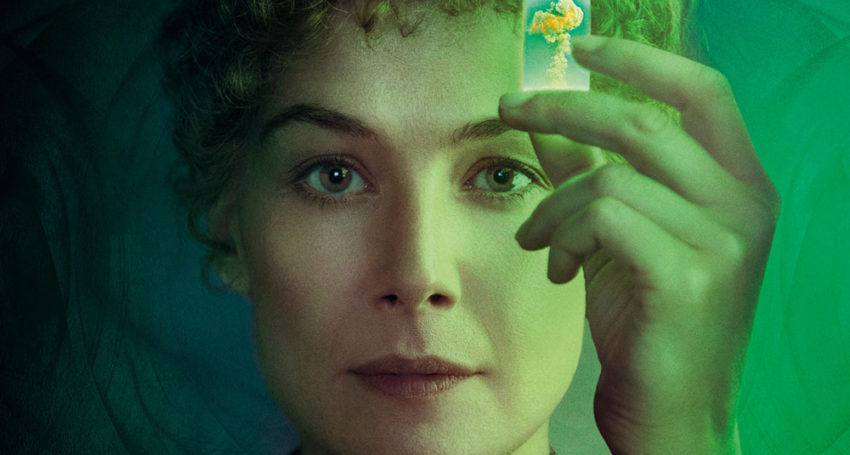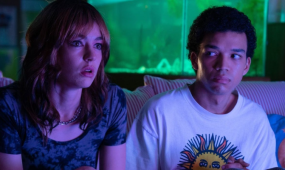Radioactive
Films & TV
“It’s a worthy tale of an astonishing woman with new insights and just a few leaden blemishes that stop it from soaring,” says anglican focus film reviewer Jonathan Sargeant on this Marie Curie biopic

The list of people who’ve changed the world is small. The list of people who’ve changed the world as significantly as pioneering chemist and physicist Marie Curie is even smaller. Hers is a story worthy of being told well. But already for a filmmaker there’s a danger. Just because a story is worthy does not guarantee a good film. In fact, worthiness can sometimes get in the way of telling a good story. Too much respect for your subject can result in a dull, hagiographic tale that smooths over any interesting creases a person might have. Not enough respect and you’ll be accused of character assassination. But that’s not all! There’s also the issue of the actual change the person brought about. How do you communicate that seamlessly and effectively? Radioactive faces all these challenges. The results? Like a decaying atom, it’s hit and miss.
Advertisement
With Radioactive, director Marjane Satrapi has adapted the 2010 graphic novel Radioactive: Marie & Pierre Curie: A Tale of Love and Fallout by Lauren Redniss. She has an affinity for such media, having written a number, even bringing her work Persepolis to the screen in 2007. That film dealt with her childhood in Iran before and after the Islamic Revolution and it’s easy to see some common themes. Both tell the story of people struggling against repressive regimes. For Marie Curie (played by a very focussed Rosamund Pike) the almost immovable scientific community of the day is personified by beetle-browed Professor Lippmann. Her status as an interloper from Poland is to the fore as well; Satrapi’s own experience brings nuance to what it feels like to be stranded, distant from one’s own culture. But she is not alone! Once Sam Riley’s Pierre Curie is on the scene the two create a formidable alliance.
Radioactive is on surest feet during these biopic moments. The love between the two scientists becomes the lens into their astounding discoveries and the eventual fate of Pierre (spoiler alert) is shattering. Whilst Marie Curie had previously derided the spiritualism of her day, she turns to seances in her grief and then seeks solace in the arms of fellow physicist Paul Langevin (Aneurin Barnard). That he is married provides another insight into Curie. Her willingness to be open about issues of female sexuality causes some uproar in the film and was new to me, as was her experience during the first World War running an X-ray unit on the Western Front!
Advertisement
It’s at moments like these, though, that Radioactive’s flaws are exposed. I haven’t read the source novel but the script often has Pike declaring the film’s themes in the place of dialogue. Every few minutes we hear her sprouting lines like “I am interested in all science that confronts prevailing attitudes!” or “I am a woman. When have other people’s opinions affected anything I’ve ever done?” The sentiments are great of course, but films that feel the need to spell these out so often seem to mistrust their own ability to tell the story.
On the other hand, Radioactive does a few things very successfully. Interspersed in Curie’s tale are interjections from history. We see a mini-narrative of a boy in the 1950s receiving radiation treatment for an illness. We see Hiroshima a few seconds before and after its fate. Chernobyl’s cataclysmic collision with unfettered radioactivity gets its moment, too. The jury is out on these fast-forward flashes, but I felt they lifted the film from by-the-numbers to something else. Where Satrapi gets to exercise her creative vision in interesting ways (Marie’s grief displayed in a touching montage, for instance), the film reaches a higher result. Though these interludes are stacked towards the negative, some closing place cards spell out the positive aspects of Curie’s legacy, thankfully.
Persepolis marked Marjane Satrapi as a dazzling talent. Radioactive shows less promise but points to the director’s creative strengths. It’s a worthy tale of an astonishing woman with new insights and just a few leaden blemishes that stop it from soaring.
Radioactive, rated M and directed by Marjane Satrapi, is currently showing in cinemas.






